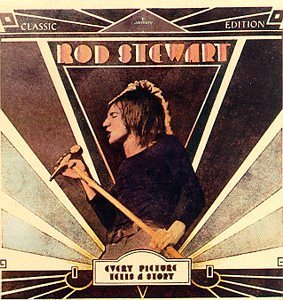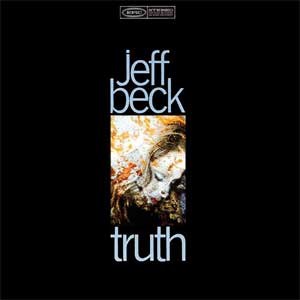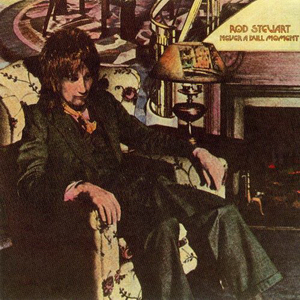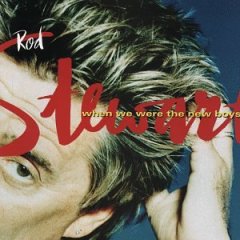Faces were an English rock band formed in London in 1969. It was formed by members of Small Faces after lead singer and guitarist Steve Marriott left to form Humble Pie. The remaining Small Faces—Ian McLagan (keyboards),Ronnie Lane,and Kenney Jones —were joined by guitarist Ronnie Wood and singer Rod Stewart,both from the Jeff Beck Group,and the new line-up was renamed Faces.

Every Picture Tells a Story is the third studio album by British singer-songwriter Rod Stewart,released on 28 May 1971,by Mercury Records. It incorporates hard rock,folk,and blues styles. It went to number one on both the UK and US charts and finished third in the Jazz &Pop critics' poll for best album of 1971. It has been an enduring critical success,including a number 172 ranking on Rolling Stone's 2003 list of the 500 greatest albums of all time.

"Maggie May" is a song cowritten by singer Rod Stewart and Martin Quittenton,performed by Stewart for his album Every Picture Tells a Story,released in 1971. In 2004,Rolling Stone ranked it number 130 in The 500 Greatest Songs of All Time. In 2017,the Mercury Records single was inducted into the Grammy Hall of Fame.

A Nod's as Good as a Wink... To a Blind Horse is the third album by British rock group Faces,and their second album of 1971. Bolstered by lead singer Rod Stewart's recent solo success with "Maggie May",it was their most successful album worldwide,peaking at No. 6 in the US,and reaching No. 2 in the UK. It also contains their biggest US hit,the swaggering "Stay with Me",and the album itself would be certified gold by the RIAA in 1972.

Truth is the debut studio album by English guitarist Jeff Beck,released on 29 July 1968 in the United States on Epic Records and on 4 October 1968 in the United Kingdom on Columbia Records. It introduced the talents of his backing band the Jeff Beck Group,specifically vocalist Rod Stewart and bassist/guitarist Ronnie Wood,to a larger audience,and peaked at number 15 on the Billboard Top LPs chart. In retrospect,Truth has been widely hailed as classic of its era and one of the earliest examples of heavy metal music.

Never a Dull Moment is the fourth solo album by rock musician Rod Stewart. It was released on 21 July 1972;that year it became a UK number-one album and reached number two on the US Album chart. The track "You Wear It Well",co-written by Stewart and classical guitarist Martin Quittenton,was a smash hit,as well as "Twisting the Night Away",a song originally recorded by Sam Cooke.

Smokin' is the fifth studio album by English rock band Humble Pie,released in 1972 by A&M Records. It was the band's international commercial breakthrough,peaking at number 6 on the US Billboard 200 album chart,and hit number 20 in the UK and number 9 in Australia.

Beck-Ola is the second studio album by English guitarist Jeff Beck,and the first credited to the Jeff Beck Group. It was released in June 1969 by Epic Records in the United States and the following August by Columbia Records in the United Kingdom. The album peaked at No. 15 on the Billboard 200,and at No. 39 on the UK Albums Chart. The album's title puns on the name of the Rock-Ola jukebox company.
"The First Cut Is the Deepest" is a 1967 song written by British singer-songwriter Cat Stevens,originally released by P. P. Arnold in April 1967. Stevens's own version originally appeared on his album New Masters in December 1967.

"Hard Luck Woman" is a song by American hard rock band Kiss and the lead single from their 1976 album,Rock and Roll Over. It was originally written by Paul Stanley as a possible track for Rod Stewart,but after the success of the soft rock ballad "Beth",Kiss decided to keep it for themselves as a follow-up. Stanley has stated his admiration and love of Stewart's music numerous times,and that "Hard Luck Woman" was inspired by Rod Stewart,in particular the songs "Maggie May" and "You Wear It Well". While Stewart's music served as a partial inspiration for the song,the nautical themed song "Brandy" by American pop-rock band Looking Glass served as Stanley's main inspiration.

"Tonight's the Night (Gonna Be Alright)" is a song written by Rod Stewart,and recorded at Muscle Shoals Sound Studio in Sheffield,Alabama for his 1976 album A Night on the Town. The song,controversial at the time of release,proved to be a massive commercial success and became his second US chart topper on the Billboard Hot 100. It made its debut at number 81 on 2 October 1976 and rose quickly,climbing from number eight to the top of the chart on 13 November 1976,and remained on top for eight consecutive weeks until 8 January 1977. It was the longest stay of any song during 1976,the longest run at the top for a single in the US in over eight years (since the Beatles’"Hey Jude" in November 1968),and the longest stay at number one for Rod Stewart in his entire recording career,and the final number one of that year. The song also peaked at No. 5 in the UK,No. 1 for six weeks in Canada,No. 3 in Australia and charted well in other parts of the world. It was the number 1 song on both Billboard's 1977 year-end chart and the year-end Canadian singles chart. It became the best-selling single of 1977 in the United States. As of 2018,it is the 19th-most popular song in the history of the chart.

"How Long" is the debut single by the English band Ace,from their 1974 debut album,Five-A-Side. It reached No. 3 on both the US and Canadian charts,and No. 20 on the UK Singles Chart.
"I Don't Want to Talk About It" is a song written by American guitarist Danny Whitten. It was first recorded by American rock band Crazy Horse and issued as the final track on side one of their 1971 eponymous album. It was Whitten's signature tune,but gained more fame via its numerous cover versions,especially that by Rod Stewart. Cash Box magazine has described it as "a magnificent ballad outing."
"Reason to Believe" is a song written,composed,and first recorded by American folk singer Tim Hardin in 1965. It has since been recorded by many artists,most notably by the Carpenters in 1970,and Rod Stewart in 1971 and 1993.

"Have I Told You Lately" is a song written and recorded by Northern Irish singer and songwriter Van Morrison for his nineteenth studio album,Avalon Sunset (1989). It is a romantic ballad that is often played at weddings,although it was originally written as a prayer. The opening line is from the song "I Forgot to Be Your Lover" by William Bell.

Unplugged...and Seated is a live album released by British musician Rod Stewart on 24 May 1993 by Warner Bros. Records. It is Stewart's second live album and his first appearance on MTV Unplugged. The unplugged versions of "Have I Told You Lately" by Van Morrison,"Reason to Believe","Having a Party",and "People Get Ready" were released as singles,with "Have I Told You Lately" and "Having a Party" reaching success as singles. A special collector's edition was released in March 2009 on Rhino Records. This two-disc package included the DVD of the performance with 13 songs while the CD contained 17 tracks including two songs not on the original 1993 release.

When We Were the New Boys is the eighteenth studio album by Rod Stewart,released on 29 May 1998. It was Stewart's last studio album to be released by Warner Bros. Records. It produced the singles "Ooh La La","Rocks",and "When We Were the New Boys".

"Ooh La La" is a 1973 song by the band Faces,written by Ronnie Lane and Ronnie Wood. It is the title song of the band's last studio album,Ooh La La.
"Cindy Incidentally" is a song by the British group Faces,written by group members Rod Stewart,Ronnie Wood and Ian McLagan. It was produced by Glyn Johns. It was included on the band's 1973 album Ooh La La,and in the same year was released by Warner Bros. Records as the first single from that album.

"Having a Party" is a song by American singer-songwriter Sam Cooke,released on May 8,1962,by RCA Victor. Produced by Hugo &Luigi and arranged and conducted by RenéHall,the song was the A-side to "Bring It On Home to Me". The song peaked at number four on Billboard's Hot R&B Sides chart,and also charted at number 17 on the Billboard Hot 100.
















